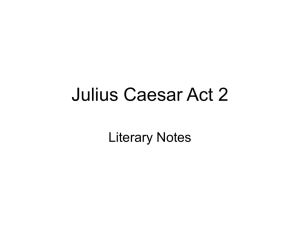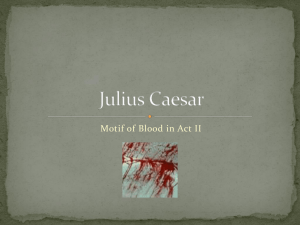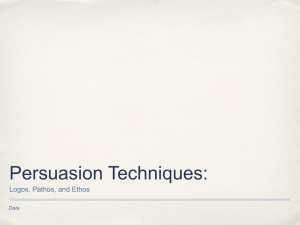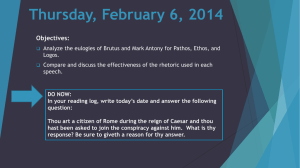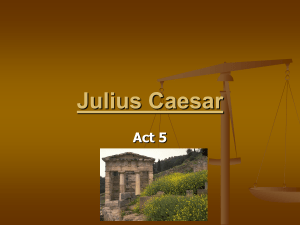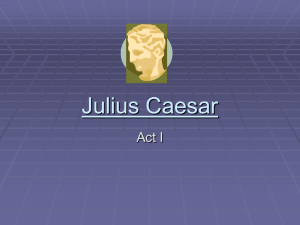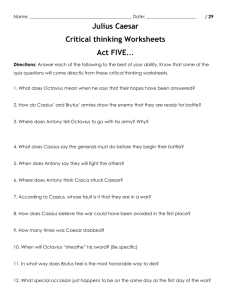JC Quotes Answer Key
advertisement
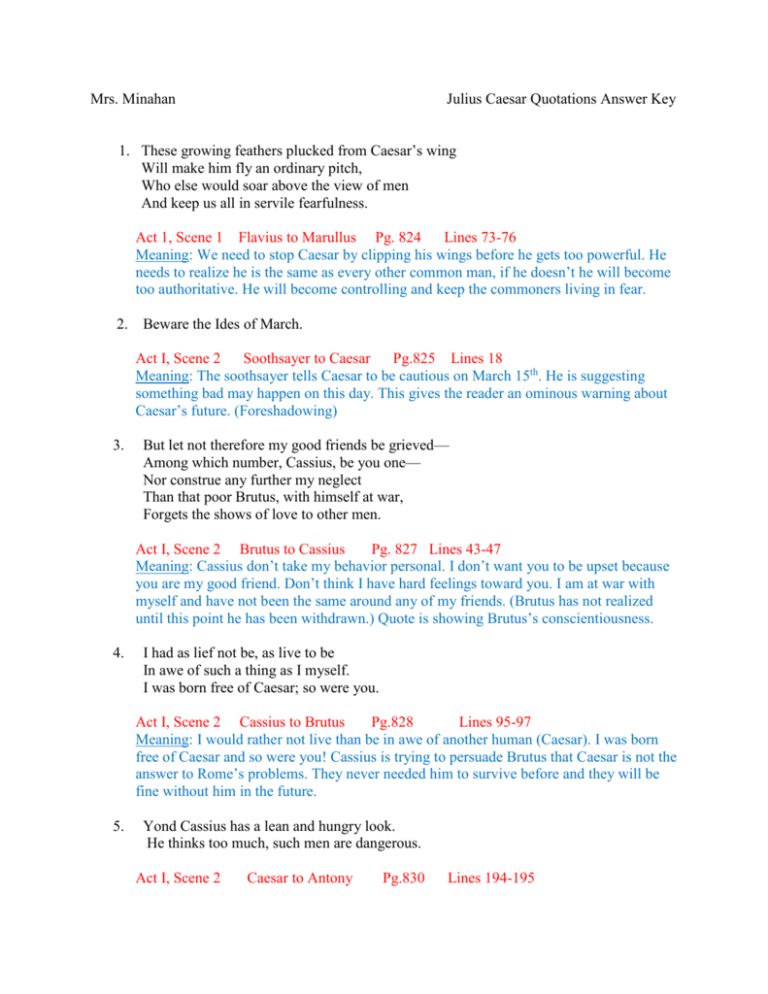
Mrs. Minahan Julius Caesar Quotations Answer Key 1. These growing feathers plucked from Caesar’s wing Will make him fly an ordinary pitch, Who else would soar above the view of men And keep us all in servile fearfulness. Act 1, Scene 1 Flavius to Marullus Pg. 824 Lines 73-76 Meaning: We need to stop Caesar by clipping his wings before he gets too powerful. He needs to realize he is the same as every other common man, if he doesn’t he will become too authoritative. He will become controlling and keep the commoners living in fear. 2. Beware the Ides of March. Act I, Scene 2 Soothsayer to Caesar Pg.825 Lines 18 Meaning: The soothsayer tells Caesar to be cautious on March 15th. He is suggesting something bad may happen on this day. This gives the reader an ominous warning about Caesar’s future. (Foreshadowing) 3. But let not therefore my good friends be grieved— Among which number, Cassius, be you one— Nor construe any further my neglect Than that poor Brutus, with himself at war, Forgets the shows of love to other men. Act I, Scene 2 Brutus to Cassius Pg. 827 Lines 43-47 Meaning: Cassius don’t take my behavior personal. I don’t want you to be upset because you are my good friend. Don’t think I have hard feelings toward you. I am at war with myself and have not been the same around any of my friends. (Brutus has not realized until this point he has been withdrawn.) Quote is showing Brutus’s conscientiousness. 4. I had as lief not be, as live to be In awe of such a thing as I myself. I was born free of Caesar; so were you. Act I, Scene 2 Cassius to Brutus Pg.828 Lines 95-97 Meaning: I would rather not live than be in awe of another human (Caesar). I was born free of Caesar and so were you! Cassius is trying to persuade Brutus that Caesar is not the answer to Rome’s problems. They never needed him to survive before and they will be fine without him in the future. 5. Yond Cassius has a lean and hungry look. He thinks too much, such men are dangerous. Act I, Scene 2 Caesar to Antony Pg.830 Lines 194-195 Meaning: Cassius looks like he is up to no good. He thinks too much and could be dangerous. (Foreshadowing) Caesar is recognizing Cassius could be a threat to him, but Caesar shrugs it off because he does not want to look fearful. 6. And after this let Caesar seat him sure, For we will shake him, or worse days endure. Act I, Scene 2 Cassius to himself (soliloquy) Pg.833 Lines 321-322 Meaning: After today, Caesar should make sure he is watching his back because we (the conspirators) will be trying to defeat him. If we fail, the future will be much worse than it is now. 7. For I believe they are portentous things Unto the climate that they point upon. Act I, Scene 3 Casca to Cicero Pg.834 Lines 31-32 Meaning: I believe these happenings are bad omens for this time and this place (Rome). At this point Cicero and Casca are discussing the bad omens that people have been seeing (people on fire, owl in the market during the day, etc.) (Foreshadowing) 8. But life, being weary of these worldly bars, Never lacks power to dismiss itself. Act I, Scene 3 Cassius to Casca Pg.835 Lines 96-97 Meaning: A person always has the power to take his/her life no matter what situation they are facing. Cassius is telling Casca if Caesar becomes king, he will kill himself. 9. Three parts of him Is ours already, and the man entire Upon the next encounter yields him ours. Act I, Scene 3 Cassius to Casca Pg.837 Lines 154-156 Meaning: Cassius is assuring Casca that Brutus is three quarters of the way committed to joining the conspirators. The next time the talk to him he will be completely on their side. 10. The abuse of greatness is when it disjoins Remorse from power Act II, Scene 1 Brutus to himself (soliloquy) Pg.841 Lines 18-19 Meaning: Greatness is abused when it separates compassion from power. Brutus is trying to decide whether to join the conspirators or not. At this point he is weighing Caesar’s personality. Right after this he says he does not know Caesar to use his emotions over reason. (Conscientiousness) 11. And therefore think him as a serpent’s egg Which hatched would as his kind grow mischievous, And kill him in the shell. Act II, Scene 1 Brutus to himself (soliloquy) Pg.842 Lines 32-34 Meaning: Brutus has talked himself into believing Caesar would become a tyrant. He is saying that Caesar is still at a vulnerable stage, but gains more power he will become controlling over the commoners. They need to kill any chances of this happening now, before it’s too late. 12. No, not an oath. Act II, Scene 1 Brutus to the Conspirators Pg.844 Lines 114 Meaning: Brutus does not feel that the conspirators need to make an official pledge to each other, their word is good enough for Brutus. He feels since they are noble Romans they should be trusted by the rest of the conspirators. 13. Let us be sacrificers, but not butchers, Caius. Act II, Scene 1 Brutus to Conspirators Pg.846 Lines 166 Meaning: Brutus is saying they should stand up against Caesar and kill him. But, he wants to do it in a “noble” fashion. Brutus feels they should kill him honorably for the good of the common man in Rome, so they should do it discretely, not savagely. 14. Let’s kill him boldly, but not wrathfully. Let’s carve him as a dish fit for the gods, Not hew him as a carcass fit for hounds. And let our hearts, as subtle masters do, Stir up their servants to an act of rage And after seem to chide ‘em. This shall make Our purpose necessary and not envious, Which so appearing to the common eyes, We shall be called purgers, not murderers. And for Mark Antony, think not of him. For he can do no more than Caesar’s arm When Caesar’s head is cut off. Act II, Scene 1 Brutus to Conspirators Pg. 846 Lines 172-183 Meaning: Brutus is telling the Conspirators they need to kill Caesar as honorably as possible to make it look like they are killing him because it is necessary, not because they want him dead. They need to keep the commoners on their side and make the murder look like it helps them. He also says to forget about Antony. They do not need to worry about him, he won’t do anything. (Brutus’s Tragic Flaw- Bad Judgment) 15. O ye gods. Render me worthy of this noble wife! Act II, Scene 1 Brutus to Portia Pg.850 Lines 302-303 Meaning: Brutus is asking the Gods to make him worthy of his noble, wonderful wife. He realizes she is trying to do help him and that she is genuinely worried. Portia is trying to find out what Brutus has been hiding from her she is reassuring him that he can trust her and that she loves him. So, there is no need to keep anything from her. 16. Thrice hath Calpurnia in her sleep cried out, “Help, ho! They murder Caesar!” Act II, Scene 2 Caesar to himself Pg.851 Lines 2-3 Meaning: Caesar is saying that the world is not at peace tonight. Calpurnia (his wife) has cried out three times in her sleep “Help, they murder Caesar.” (Foreshadowing) 17. It seems to me most strange that men should fear, Seeing that death, a necessary end, Will come when it will come Act II, Scene 2 Caesar to Calpurnia Pg.852 Lines 35-37 Meaning: Caesar is saying that he thinks it is useless to fear death. He knows he will die someday and he acknowledges that when his time is up, his time is up and there is nothing he can do to prevent it. So, why worry about it. (Fate) 18. Alas, my lord, Your wisdom is consumed in confidence. Act II, Scene 2 Calpurnia to Caesar Pg.852 Lines 48-49 Meaning: Calprunia is worried that Caesar is overconfident and is trying to warn him he should be more concerned and careful about what he is doing. 19. And so near will I be That your best friends shall wish I had been further. Act II, Scene 2 Trebonius to himself/audience (Aside) Pg.855 Lines 123-124 Meaning: Trebonius is saying that he will be so near to Caesar that Caesar’s best friends will wish Trebonius was further away from him. (Foreshadowing) 20. If thou read this, O Caesar, thou mayst live; If not, the Fates with traitors do contrive Act II, Scene 3 Artemidorus to himself (soliloquy) Pg. 855 Lines 14-15 Meaning: Artemidorus has written Caesar a letter warning him of the conspirators’ actions. He hopes Caesar will read his letter before it is too late. If Caesar reads the letter he may live, if he does not read it Fate will have its way and Caesar will most likely die. I have a man’s mind, but a woman’s might. 21. Act II, Scene 4 Portia to Lucius Pg.856 Line 8 Meaning: Portia is saying she has a man’s mind, but a woman’s strength. She is saying she is not as strong as Brutus (men) because she can’t keep a secret. Women are not as strong in this department. 22. Trebonius knows his time, for look you, Brutus. He draws Mark Antony out of the way. Act III, Scene 1 Cassius to Brutus Pg. 862 Lines 25-26 Meaning: The conspirators’ plan is starting to take place. Cassius is reassuring Brutus That everything is going to be fine. Trebonius is getting Antony out of the way, so the plan can be executed. Everyone is taking their places. 23. Hence! Wilt thou lift up Olympus? Act III, Scene 1 Caesar to Conspirators Pg.863 Line 75 Meaning: Caesar is comparing himself to Mt. Olympus-the home of the Greek Gods. Therefore, he is comparing himself to a God. How could you do this to someone like me? 24. Liberty! Freedom! Tyranny is dead! Act III, Scene 1 Cinna to Conspirators Pg.863 Lines 78 Meaning: Rome is free, Caesar is dead. He cannot become a tyrant. He wants everyone to know they don’t have to worry anymore. 25. You know not what you do. Do not consent That Antony speak in his funeral. Act III, Scene 1 Cassius to Brutus Pg.868 Lines 231-232 Meaning: Cassius is warning Brutus that he should NOT let Antony speak at Caesar’s funeral. Cassius is afraid Antony will get the commoners against the conspirators. (warning/foreshadowing) 26. Censure me in your wisdom, And wake you senses, that you may the better judge. Act III, Scene 2 Brutus to Plebeians Pg.870 Lines 16-17 Meaning: Brutus is telling the Plebians to judge him with their wisdom. He tells them to pay close attention to what he is about to say, so they can form an opinion him using their best judgment. 27. Not that I loved Caesar less, but that I Loved Caesar more. Act III, Scene 2 Brutus to Plebeians Pg.870 Lines 21-22 Meaning: Brutus is trying to convince the crowd the conspirators killed Caesar for honorable purposes. He is saying he was not involved because he disliked Caesar, but because he cares about the commoners of Rome more than he cared about Caesar. 28. Friends, Romans, countrymen, lend me your ears. Act III, Scene 2 Antony to Plebeians Pg.872 Line 74 Meaning: Antony is asking the plebeians to listen to what he has to say. They listened to Brutus, now he wants to tell his side of the story. He calls them friends to make them feel comfortable with him and so that they feel they can trust him. He is letting them know they are all equal and he does not feel as if he is better than them. 29. Yet Brutus says he was ambitious, And Brutus is an honorable man. Act III, Scene 2 Antony to Plebeians Pg.873 Lines 94-95 Meaning: Antony is using Brutus’s words against him. Antony is making the crowd question Brutus’s motives with his own words. Brutus said Caesar was ambitious and Antony is trying to show Brutus is using this as an excuse for what they did. Antony makes sure he is speaking well of Brutus because he cannot speak out against the conspirators. 30. Let but the commons hear this testament— Which, pardon me, I do not mean to read— Act III, Scene 2 Antony to Plebeians Pg.874 Lines 131-132 Meaning: Antony is trying to get the plebeians interested in what Caesar’s will says, he is using it to gain their interest by telling them he does not want to read it to them. He knows once they hear what Caesar has left them they will be turned against the conspirators. 31. Now let it work. Mischief, thou art afoot, Take thou what course thou wilt. Act III, Scene 2 Antony to himself/audience (aside) Pg.877 Lines 261-262 Meaning: This aside reveals that Antony intended all along to stir up the plebeians’ anger against the conspirators. Now that they are angry, he is saying that he did his part and whatever the plebeians do is what fate has in store for the conspirators. 32. It is no matter, his name’s Cinna. Pluck But his name out of his heart, and turn him going. Act III, Scene 3 Fourth Plebian to Plebians Pg.879 Lines 34-35 Meaning: The plebeians are eager for revenge after hearing Antony’s speech. They attack and kill an innocent man, Cinna (the poet), because he has the same name as one of the conspirators. 33. These many then shall die, their names are pricked. Act IV, Scene 1 Antony to Octavius and Lepidus Pg.884 Line 1 Meaning: Antony, Octavius, and Lepidus (the triumvirate) are deciding who should pay for Caesar’s death. They are making a list of men they feel should die for their crime. 34. Do not talk of him But as a property. Act IV, Scene 1 Antony to Octavius Pg.885 Lines 39-40 Meaning: Antony is talking about Lepidus and how he feels he is not worthy and important. He is telling Octavius to think of Lepidus as something to be used. Antony plans on using Lepidus to do their running around and then plans on ditching him when he is no longer needed. 35. You have done that you should be sorry for. There is no terror, Cassius, in your threats, For I am armed strong in honesty That they pass by me as the idle wind Which I respect not. Act IV, Scene 3 Brutus to Cassius Pg.889 Lines 65-69 Meaning: Brutus and Cassius have been bickering over petty matters. Brutus is telling Cassius he is not threatened by him. He says Cassius’s threats are idle and he ignores them. Brutus does tell Cassius he has wronged him and is about to tell ask him about the money Cassius never sent Brutus’s troops. 36. And we must take the current when it serves, Or lose our ventures. Act IV, Scene 3 Brutus to Cassius Pg.894 Lines 222-223 Meaning: Brutus is saying that their plan and army is at its high point right now. The only way for them to go is down from here. They need to make a move now, or their chances will be lost. They need to start the battle now, before it’s too late. 37. Why comest thou? To tell thee thou shalt see me at Philippi. Act IV, Scene 3 Brutus to Ghost, Ghost to Brutus Pg.896 Lines 282-283 Meaning: The ghost of Caesar appears to Brutus. Brutus asks the ghost why it has come to him. The Ghost responds that it will see Brutus again at Philippi. This probably means Brutus will die at Philippi. (Foreshadowing) 38. But sufficeth that the day will end, And then the end is known. Act V, Scene 1 Brutus to Cassius Pg.905 Lines 124-125 Meaning: Brutus and Cassius are getting ready to part and say their final farewells. Brutus is finally admitting the fact that today may be the last day of his life. He says the day will end no matter what the circumstances may be, and only then they will know what the final outcome of day will be. 39. Caesar, thou art revenged, Even with the sword that killed thee. Act V, Scene 3 Cassius to himself/Caesar’s Spirit Pg.906 Lines 45-46 Meaning: Cassius is about to die and these are his final words. He is saying that Caesar’s spirit has gotten revenge now. Cassius is going to die by the same sword that killed Caesar. 40. O hateful error, melancholy’s child, Why dost thou show to the apt thoughts of men The things that are not? Act V, Scene 3 Messala to Titinius Pg.907 Lines 67-69 Meaning: Messala and Titinius have just come across Cassius’s dead body. They are trying to make sense of his death. Titinius has realized Cassius has misinterpreted what has happened on the battlefield and has taken his life because of it. He is asking why people have to read into things before they know the facts. They always fear the worst. 41. O Julius Caesar, thou are mighty yet! Act V, Scene 3 Brutus to himself/Caesar’s spirit Pg.908 Line 94 Meaning: Brutus is saying that even though Caesar is dead, he is still causing trouble. He is causing those who hurt him the pain they deserve. 42. Caesar, now be still. I killed not thee with half so good a will. Act V, Scene 5 Brutus to himself/Caesar’s spirit Pg.911 Lines 50-51 Meaning: Brutus is saying that Caesar can now rest in peace. Brutus is about to kill himself and he Caesar has gotten his revenge. Brutus says he is more willing to kill himself at this moment than was to kill Caesar. 43. This was the noblest Roman of them all. All conspirators, save only he, Did that they did in envy of great Caesar He only, in a general honest thought And common good to all, made one of them. His life was gentle, and the elements So mixed in him that Nature might stand up And say to all the world, “This was a man.” Act V, Scene 5 Antony to his army Pg.912 Lines 68-75 Meaning: Antony is talking about Brutus. He is saying that Brutus was the only conspirator that was involved in the plan that honestly was involved for the good of the common people, not for personal reasons. Antony says Brutus’s life was noble and he should be considered a virtuous man. All men should strive to be like Brutus.



